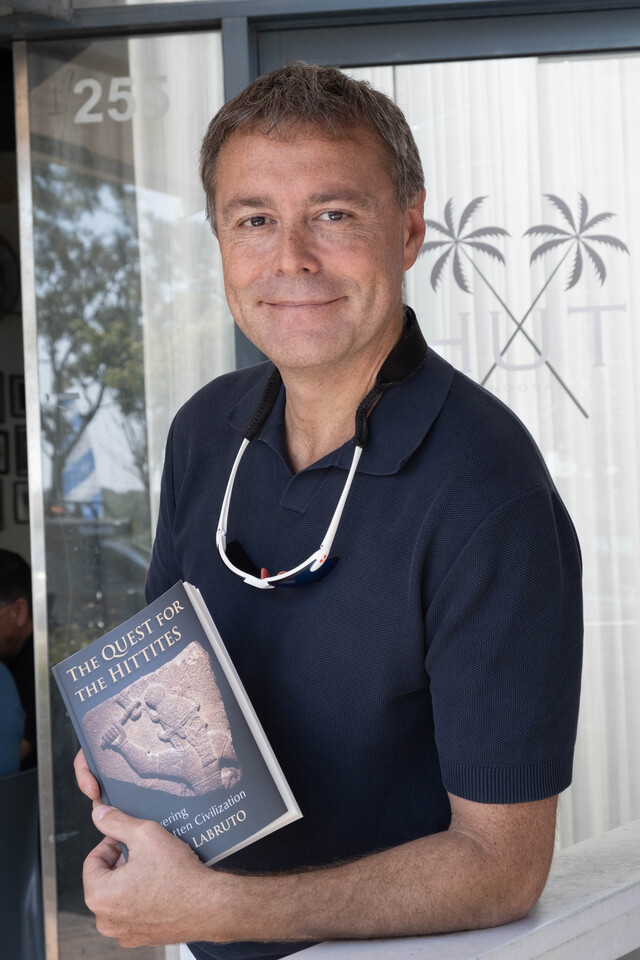An Italian doctor and Associate Professor of Radiology, who travelled across the world to base himself in Noosa and work during the day on night time trauma cases in Scandanavian and UK hospitals, has just published a book on the discovery of an ancient civilisation, the Hittites.
Dr Fausto Labruto was born in Sicily and completed his medical studies in Italy before obtaining his PhD in traumatology at Karolinska Institute in Stockholm, Sweden, where he later became an Associate Professor of Radiology.
For the past six years he has headed the Emergency Radiology team at Telemedicine Clinic (TMC).
TMC pioneered teleradiology services in Europe when it was founded in 2002 and has since become a vital partner for more than 110 radiology departments in Sweden, Denmark, Norway and the UK. This year, the team of about 300 specialised radiologists will report almost 500,000 cases.
The on-call service provided for Scandinavian and UK hospitals during European night time from Sydney and Noosa has been especially popular.
Fausto moved to Sydney initially to take on the head role before moving to Noosa.
“I wanted to open another office in Australia to give overseas radiologists an opportunity to experience another side of Australia not just Sydney, and after a while I saw that everybody loved Noosa so much so I thought I should move up there,“ he said.
Taking advantage of the time difference enables him to be be a night radiologist while working in the day.
“I work online. I don’t work in a hospital and I don’t meet any patients. Images are sent to me from UK and Sweden and Denmark,“ he said.
“If there’s an emergency scan at night in England, for example, it’s daytime here, that’s why they send the scans to me or my team.“
Fausto has authored numerous articles and book chapters in the field of emergency radiology and lectures online on radiology.
His book, The Quest for the Hittites: Uncovering a Forgotten Civilization, is his first non-medical work, drawing on his interest in ancient history and ancient languages that began as a child.
“I studied Ancient Greek and Latin in school where I grew up in Sicily. The professional life has taken me away from ancient history and ancient languages but my passion remains, so through the years since the school years I studied not just Ancient Greek and Latin but Ancient Egyptian, Coptic and also have a You Tube channel where I give short presentations on ancient languages and try to show how you can read an ancient manuscript in Greek or Latin, Egyptian and so on,“ he said.
It was both the interesting culture of the Hittites and their story of rediscovery that attracted Fausto to them.
The Hittites were one of the most powerful peoples of the ancient Near East, challenging other nations, including the mighty Egyptians, from their Anatolian stronghold.
Then, their empire collapsed and lay forgotten for about 3000 years until a motley group of scholars, archaeologists, and adventurers including an explorer fluent in 29 languages, code-crackers and grave robbers, rediscovered the Hittites across an historical backdrop weaving through the worlds of German kaisers, Turkish sultans, and even the Nazis.
“Until 150 years ago we knew nothing about them. We didn’t know where they were located, where their cities were, we didn’t know that they had a language, what it was like, anything about their history – nothing – and then little by little, small clues came out, archeological findings, the findings about their tablet, and then their tablets were finally deciphered and suddenly we learnt about the rich history and it was a journey of discovery,“ he said.
“And I thought this was so interesting that I wanted everyone to learn about it.“
Fausto spent two years methodically researching the findings of the Hittites, with more than 200 bibliographic references in his book.
“The first researchers were in Victorian England, then more discoveries were between the world wars I and II because German scholars and archeologists were among the first ones attracted to the study of the Hittites,“ he said.
“Kaiser Wilhelm II was very interested in archeology so a whole generation of scholars was created on the impetus given by the Kaiser. When the Nazis took over and ruled over Germany they continued this tradition but there was a specific interest for Nazis in finding the roots of the so-called Aryan race.
“The Aryan race didn’t ever really exist. It was a Nazi invention but they were very keen on finding evidence that could support their theory.
“They firmly believed the German race came from Indo-European cultures and the Hittites were an Indo-European people, however, there was no connection whatsoever.“
The Hittites were a dominant power during the Bronze Age from the 15th to 13th centuries when life was a fight for survival.
“The people who flourished in that age, the Egyptian people, the Assyrian, the Hittites and the Babylonian kingdom were often engaged in warfare,“ Fausto said.
“One thing that transpires from this book is that war, conquest, expansion, fights for territory, were everyday things for that people. However it was interesting to learn that they were not just engaged in war. They cultivated their religious beliefs, they were strong in commerce, it was a time when the first metals were being mined – tin and coppers were more valuable than gold, combining them as bronze they were used for weapons.“
Fausto said his book outlines how there was more commerce and international relationships going on than we were led to believe and while not everything is known about the civilisation much has been learnt, with some surprises.
“We can’t say that the Hittites were opulent as much as the ancient Egyptians that built enormous constructions and tombs rich in gold artefacts. By comparison they were not rich people but I like to think they lived a refined life because they engaged in literature and religious rituals.
“They believed in slavery and had a basic judicial system. This is common to other societies of Bronze Age, Democracy wasn’t invented until the Greeks Iron Age many centuries later.
They were neither democratic not equitable, however they weren’t as brutal as we may think. They had respect for human life as we learn from their writings.
“I still think people at large there’s a misunderstanding these people were very basic or ignorant. Evidence shows they had knowledge of mathematics, sciences, their commerce and religious beliefs were very advanced and sophisticated.
“The Hittite religion was a polytheistic religion.
“It started as many religions of that time believing in gods that ruled the natural phenomenon – the tempest god, the sun god.
“The Hittites did not live with big constructions as the Egyptians or Assyrians however we do have some sanctuaries in Anatolia.
“The position and way sanctuaries were constructed showed us people were strongly linked to the seasons of the year and the movement of the sun and the stars and the moon. They also believed in ritual purification through water which is also common to other cultures of the age.
“Through the span of their kingdom that was over centuries, beliefs were coming from southern Mesopotamia and from Babylon. Their mythology was enriched through the contact with other people such as Babylonians, Egyptians and Assyrians. We can say the Hittites were very open to acquiring the religious beliefs of their neighbours.“
Fausto’s research showed how the increasing size of the Hittite kingdom as other ancient civilisations led to its demise.
“However advanced and sophisticated, they were living always on the brink of extinction because natural phenomenon and warfare had a huge impact on their survival. What we learn from the fall of the Hittite empire is that empires and kingdoms could reach a critical point where their organisation is not sophisticated enough to dominate over such a vast area,“ he said.
“They may not have communication capable of holding over such a large area, or military organisation to defend their borders.
“Neighbouring countries can attack and they don’t have the means to sustain their attack. This is what happened to the Hittite. More likely their demise was linked to larger populations of barbarians (outsiders). They were not as organised but they took advantage of the weakness of the boundary of the empire.
“This repeated itself in history, even the Roman Empire fell because of the arrival of attacks at its periphery. It had reached the size it was difficult to protect.“
Fausto is already working on his second book on another ancient people and their language – the Etruscans of ancient Italy – who lived much later than the Hittite, in the Iron Age, and developed in central Italy just prior to the rise of Rome.
Fausto sees his role in his writing to popularise the work other people have done.
“In a way I’m a translator of difficult concepts to the layman. This book can be read by anyone without prior knowledge of the culture or language,“ he said.
“This is same thing I do with my You Tube channel. I like to make hard concepts easy to follow. I stand on the shoulders of giants that preceded me and make their work more accessible to everyone.
“Part of my work to give homage to the work of these excellent scholars.“
The Quest for the Hittites: Uncovering a Forgotten Civilization by Fausto Labruto is available from Amazon at
amazon.com.au/Quest-Hittites-Uncovering-Forgotten-Civilization/dp/1476692394








